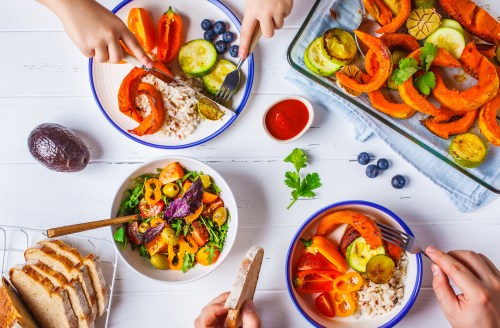Our editors independently select these products. Making a purchase through our links may earn Well+Good a commission
If there’s one food lesson we learned this year, it’s the importance of plant-based eating for health and the environment. But it’s one thing to know that eating fewer animal products and more plants is associated lots of benefits—from reduced risk of heart disease to better digestive health—and another thing entirely to commit to it 100 percent. Sometimes you just need a real beef burger, you feel me?
If you feel seen by the above, then you’d probably be down with one of the buzziest eating plans right now: the flexitarian diet. The term has been around for about a decade; it was coined by dietitian Dawn Jackson Blatner, RDN, in her 2008 book The Flexitarian Diet: The Mostly Vegetarian Way to Lose Weight, Be Healthier, Prevent Disease, and Add Years to Your Life. But it’s something that really started to pick up steam in the healthy community in recent years, as more and more people became aware of the health and environmental consequences of eating tons of meat.
“The flexitarian diet gained momentum because it’s perfect for those looking to increase consumption of plant-based foods without having to commit to a 24/7 vegetarian or vegan lifestyle,” says Charlotte Martin, MS, RDN, CSOWM, CPT. Also, with sustainability efforts on the rise, many people are looking for ways to decrease their carbon footprint, and reduced meat consumption is definitely one of those ways.
But how does this eating plan work, and is it too good to be true? Here’s the lowdown from experts.
What is flexitarian, exactly?
“Flexitarian is a combo of two words: vegetarian and flexible. It’s a less rigid form of a vegetarian diet, meaning it provides opportunities to incorporate meat into your meal plan, just in smaller quantities than you may be used to now,” says Alex Lewis, RD, LDN, a dietitian for Baze. It’s not a strict meal plan, but rather a way of eating that’s healthier and more lenient.
You can eat pretty much everything; there aren’t strict eliminations or no-gos on this eating plan. People who follow it are mostly adding in more plant-based sources of protein to their diet like legumes and grains, like quinoa, says Maggie Michalczyk, MS, RD. Also on the menu are lots of fruits and veggies, spices and herbs, and eggs, and then dairy, meat, and fish in moderation.
Hold on…how is this different from being vegetarian or vegan?
“It’s different from being vegan or vegetarian because you are not completely required to give up meat [or other animal products], and eggs are encouraged as a good source of protein and nutrients,” says Michalczyk. (This makes it pretty similar to the Mediterranean diet.) Instead, you’re simply encouraged to increase consumption of plants and plant-based proteins (i.e. beans, legumes, tofu, quinoa, and nuts) and then cut back on animal meat. When the mood strikes you can have a burger or steak. In fact, you can enjoy as much as 28 ounces of lean meat or poultry per week, Michalczyk adds.
What are the benefits?
Since the term “flexitarian” is still relatively new, most of the available research studying plant-based diets focuses on vegetarian diets. But the experts we spoke to say that it’s likely to produce similar health benefits.
For one thing, “more research shows that those following vegetarian and semi-vegetarian diets had lower glucose and insulin levels, and a reduced likelihood of diabetes, compared to non-vegetarians,” Martin says.
A higher intake of fiber, healthy-fats, and antioxidants from plant-based foods (which are the focus of flexitarian eating) is also great for your heart. “Plant-based diets are associated with lower blood pressure, lower total cholesterol, and increased HDL cholesterol (aka “good” cholesterol),” says Martin. In fact, one study found that vegetarian dietary patterns reduced risk of heart disease by 40 percent.
It can also be helpful for healthy weight management. “Research shows that individuals following a vegetarian diet tend to weigh less and have a lower BMI than those who don’t,” Martin says, so following a flexible vegetarian diet could have similar results.
Plus, by keeping some forms of meat in your diet, you’re still getting the benefits of iron, B vitamins, omega-3 fatty acids, and other nutrients critical for health that are more readily available in animal foods. Basically, it’s the third healthiest diet for a reason, per U.S. News and World Report.
Is it worth trying?
If eating healthy without too many restrictions appeals to you, then yes, absolutely. Any type of diet or meal plan that encourages you to view foods from an “abundance mindset” versus restriction is a win-win, says Lewis. “Additionally, lowering our meat intake not only has positive impacts for our own health, but that of our planet as well so you really can’t go wrong,” she says. “I even think it can shave a few dollars off of your grocery bill because you’d be buying less meat,” adds Michalczyk.
People who prefer meat as their primary protein source might struggle with this way of eating, Michalczyk says, as would people who are extremely strapped for time since it involves some cooking. But she says that going flexitarian shouldn’t be a huge shift for most people since it doesn’t require huge dietary changes. Plus, with the blended meat movement (where meat products like burgers and sausages are made with half vegetables) gaining traction, there are more ways than ever to be flexitarian without feeling food-related FOMO.
The flexitarian diet is what it sounds like—flexible—a huge win in the long run for sustainable eating patterns. And with benefits for your bod and the environment, it’s certainly an eating plan worth our attention in 2020.
Looking for more intel on healthy eating plans? Here’s what you should know about Whole30 before diving in. And the Mediterranean diet is the best eating plan for your gut health, because of course it is.
Sign Up for Our Daily Newsletter
Get all the latest in wellness, trends, food, fitness, beauty, and more delivered right to your inbox.
Got it, you've been added to our email list.










